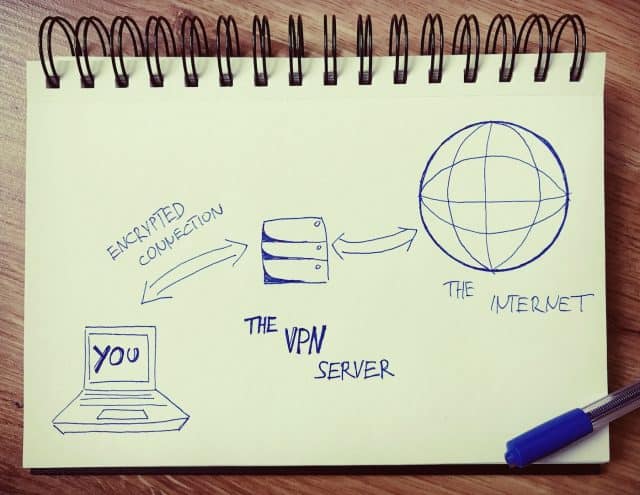What Is A Virtual Private Network – (VPN)?

A virtual private network, VPN for abbreviation purposes, is an organization and managed IT service providers best friend. What exactly is a VPN? A VPN is a service that lets you access the web safely and privately by routing your connection through a server and hiding your online actions. In short, a PC connects to the VPN server. The connection between you and the VPN server becomes encrypted. Encrypted data is unreadable by humans and computers. The VPN connection becomes active and can now browse out to the internet without someone intercepting the users connection.
Below is a simplified drawing of how a person’s laptop connects to the Virtual Private Network and how the connection goes out to the Internet. Let’s discuss some topics to educate you on what exactly VPN is and how your business can benefit with a VPN service.
How Does a Virtual Private Network Work?
The illustration above communicates how a VPN connects from a PC to the VPN server and back out to the Internet. The real question is how does a VPN work? First, connecting to the VPN establishes a digital barrier. Second, the barrier creates a secure connection to a hub, typically a server or firewall. The internet only sees what the barrier sends out. Therefore, web viewing privacy protection remains active while connected to the VPN. Lastly, information sent from a computer to the VPN becomes encrypted, keeping personal information safe. No one can brute force attack and gain access to the company’s data. A VPN connection is difficult to hack and change any files on a computer to allow them access to sensitive data. Provide employees proper training on how to use a VPN. In particular work with your managed service IT provider for VPN implementation and training.
Why Should A Business Use A Virtual Private Network?
Cybersecurity for a business will always remain a top priority. For example, no matter what size the business, secure connections to the company server is a must. Similarly a small business can implement a VPN with affordable hardware and some training from your technical partner. For this purpose let’s discuss why and how a business can implement a VPN.
Your Internet connection is hack proof. The business’ VPN connection creates a virtual “tunnel” within the Internet through which your Internet activity travels. Malicious entities won’t be able to find soft spots in the network. Even if a hacker were to try and bust through the tunnel, the VPN network will sense it, shut off that part of the network and reroute your activity to ensure its safe, secure delivery to its destination.
Your Internet activity is encrypted. For instance, not only does all your traffic travel through a secure tunnel, it is completely jumbled up and unreadable. Online spies would only see unreadable computer digits and would not be able to recreate the content. The online spies wouldn’t even bother.
Above all, a business can implement a VPN no matter if you’re an entrepreneur or a business of 100 members. Maintaining a secure connection when traveling and connecting to a company server is essential. Do not allow online spies to view any of your activity.
When Should A Business Use A VPN?
The short answer is: it depends. In particular if a business individual travels frequently and accesses company data, a VPN is a solid idea. The reasons above explain the value of a VPN. On the other hand, if employees mainly work in an office and do not need remote connectivity access to the company’s network – a VPN would not be practical. For this purpose let’s assume a business has associates who travel often. When traveling, there aren’t many WiFi options that are truly secure.
For instance, using Starbucks or other coffee chains’ WiFi connection is extremely insecure. For starters, the WiFi signal is open to the public, meaning anyone can logon. Second, the security protocols on the WiFi system have little to no actual security. Most free WiFi systems use outdated security protocols such as Wired Equivalent Privacy (WEP). Lastly, sophisticated enough hackers can gain access to your device while being on the same WiFi network when in a Starbucks.
How does a VPN help in this instance? First a VPN encrypts your activity on the web. Meaning no human or computer can read what you’re doing at any given moment. Second it helps keep the connection protected when using a public WiFi hotspot. Lastly, It hides your location, enabling you to access geo-blocked content (e.g. on Netflix and other sites). Finally using a VPN when accessing sensitive data or working within your company files provides a gatekeeper that blocks uninvited individuals.

